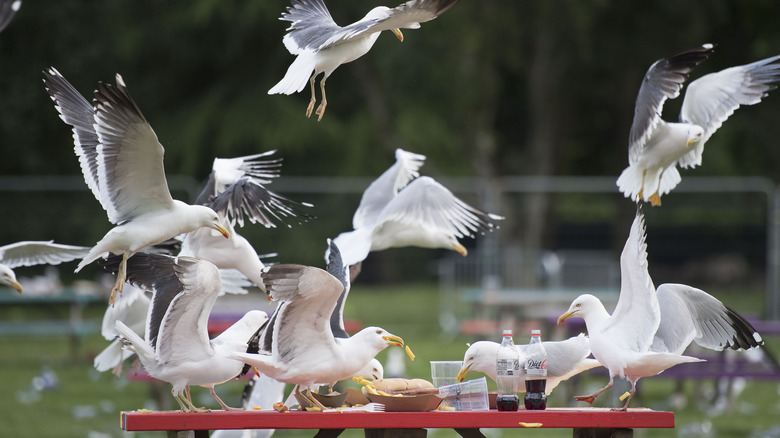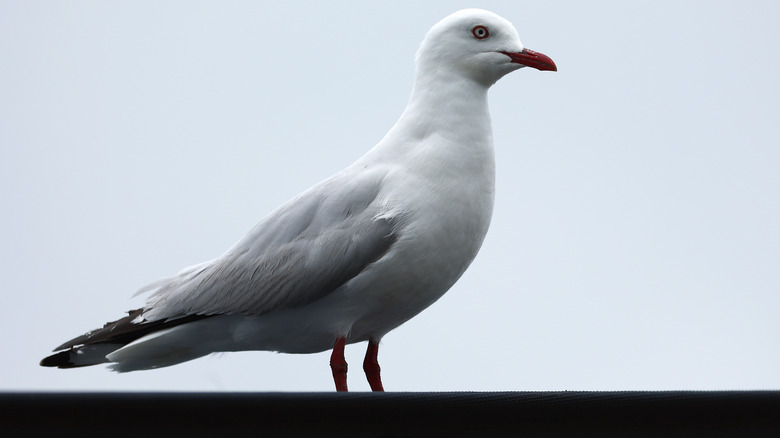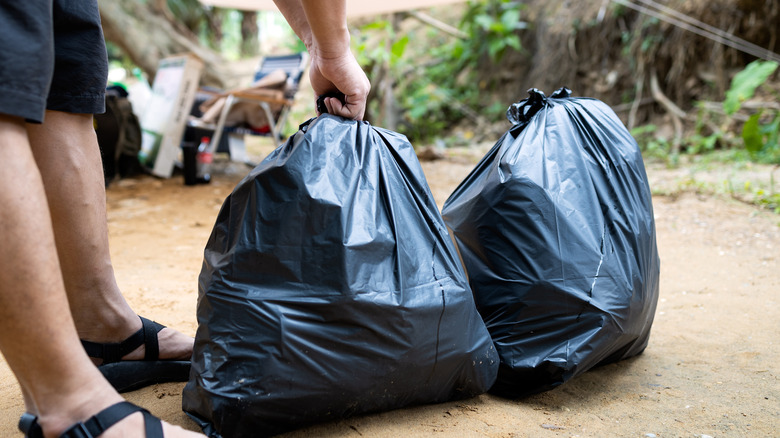Seagulls: How These Pesky Birds Will Wreak Havoc In Your Yard (Even If You're Not On The Coast)
We may receive a commission on purchases made from links.
We hang up birdhouses, birdbaths, and birdfeeders in our backyards with the hopes of attracting some feathered friends. Whether you have a fondness for birdwatching or just like the sound of birds chirping while you make your morning coffee, they're a pleasant addition to your garden. But there is one species that you don't want to be a visiting regular, and that's the seagull. These pesky birds like to raise trouble by getting into your trash, leaving droppings all over your patio furniture, and making tons of noise with their loud cries. Your backyard will no longer feel like a haven with them around, so it's best to get rid of them as soon as you spot them.
You might think that you're safe from these large, white birds if you don't live near the coast or a body of water. After all, when you picture a seagull, you probably think of one circling a beach boardwalk, calculating which funnel cake or hot dog to nip out of a tourist's hands. But these calculating birds are known to fly up to 50 miles from the water, so they can very well make a home in your backyard if you fall within that radius. Here is why you want to keep them out of your yard, and how to deter them if they try to set up shop.
Why you don't want seagulls in your backyard
Seagulls are one of the birds you don't want to see in your yard, and for good reason. They create a lot of havoc. First and foremost, they can make a mess out of your trashcans, spilling garbage in your backyard and attracting other neighborhood pests into your garden. Seagulls are scavengers, and they're not picky about what they eat. In fact, they snack on everything from fish to insects to eggs, so they will happily pick through the scraps in your bins if you're not careful. If they rip open bags or throw contents onto the pavement or grass, it can attract other foraging pests, such as raccoons and rats.
Seagulls can also make a mess of your backyard furniture with their droppings. Not only will these visiting birds have you scrubbing seat covers and tabletops weekly, but their droppings are also corrosive, which can lead to permanent damage. That's because it contains uric acid, which is capable of stripping paint and cause pitting in steel if it's not quickly cleaned up. In addition to ruining your carefully curated furniture, seagull droppings can spread harmful bacteria and diseases. For example, in 2016, scientists found that seagulls were spreading a dangerous strain of E. Coli that was resistant to antibiotics, according to National Geographic. To avoid these dangers, it's best to keep these birds out of your garden.
How to deter them from your yard
Since seagulls are oftentimes seen circling landfills and poking through dumpsters, the easiest thing you can do to deter them is to ensure your trash is safely stowed away. Pests usually visit yards that can provide adequate food and shelter, so make sure your property feels inhospitable. When it comes to your trashcans, make sure you don't overpack them, allowing the lid to firmly shut over the container. Also, make sure the bags are tied tightly so it's not easy to get to the scraps inside. If you're worried they might knock the garbage lid off to get to its contents, lock the can shut. You can do so using a lid latch, like the one SafeWaste sells on Amazon for $15.
You can also try to make your backyard seem uninviting to nest in. These birds usually like building their homes on high rooftops and chimneys, so add things like seagull spikes (which don't harm birds) or bird netting to these areas. The metal spikes are dull at the tips, so they won't hurt any animals, and you can get a 16-pack from Mjokoj on Amazon for $20. The bird netting is great for going over chimneys or open nooks that the birds would want to settle in, and you can get a 40-foot roll from Rifny on Amazon for $26. Both will stop the birds from accessing these points, forcing them to find a spot that's easier and more convenient.


